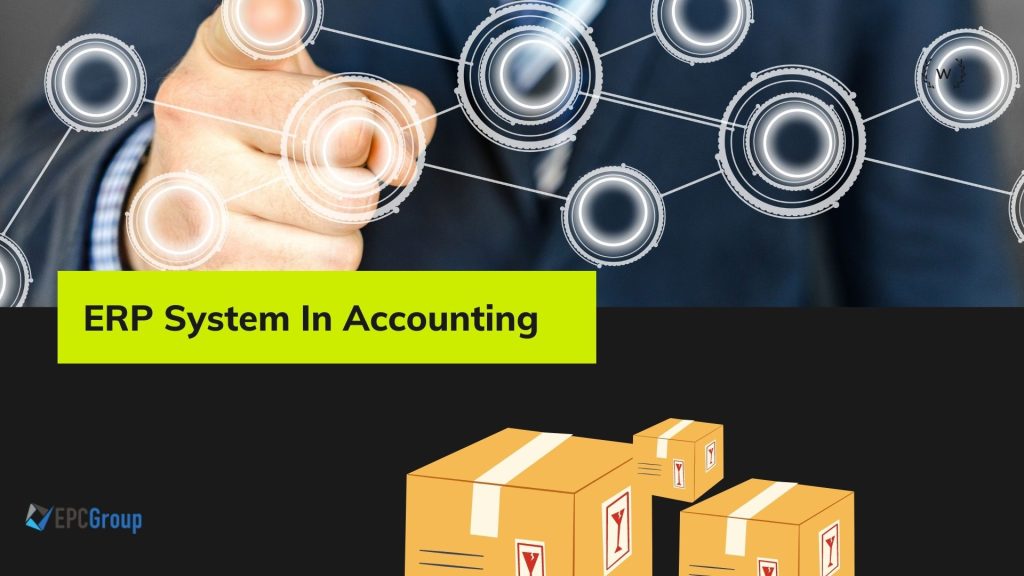Many companies today have separate systems for ERP and accounting. Depending on the size, an organization might not even have ERP. Often, they obtained such applications at different times and implemented them for their main purpose: an accounting package for financial management and ERP for operations management.
You see, that separation is no longer needed, nor even a smart idea.
The popularity of ERP-based accounting software stems from its benefits that will be unveiled later in this post, particularly in connection to the benefits conferred by it on the field of accounting.
Introducing Accounting through ERP System
The finance and accounting department of your company is indispensable. The way they work could be different and unique at the same time. However, the goal is nearly the same.
You will find many unique things to deal with, from capital requirement estimation to disposal of surplus to manage financial and cash control. You will find different activities to look after.
An integrated Financial Accounting ERP system enhances cost accounting and enables managers to precisely determine the budget and allocate costs (for transportation, labor, raw material, and other overhead expenses).
No matter if it’s about paying wages to workers, making payments to vendors, or financial forecasting, all you need is ERP accounting software.
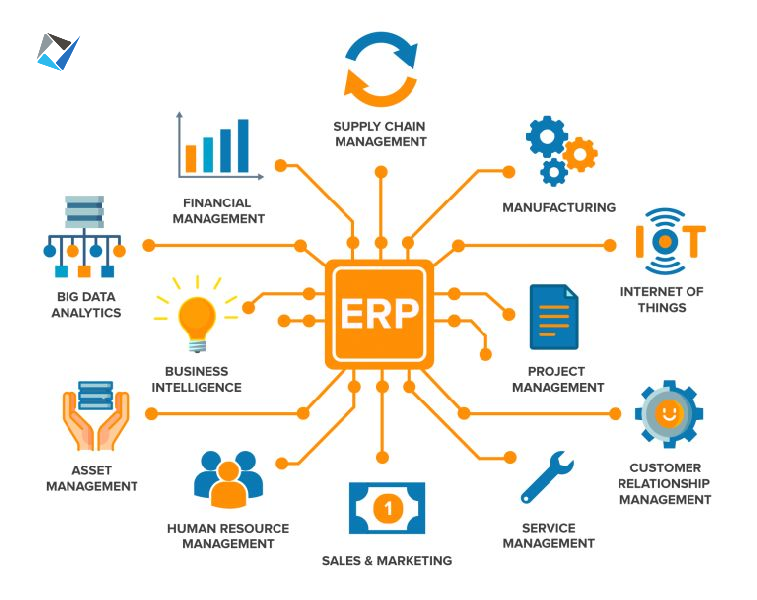
Present-day challenges in Accounting with traditional accounting software
Accounting problems are quite typical among those using traditional accounting software, which they assume could make their accounting task simpler. Accounting software that offers too many challenges is typically the ones that are outdated and not that user-friendly.
Some of the problems faced by most businesses when using traditional business accounting software include the following:
| Poor speed of access Inconvenient technical support through phone · No 24/7 technical assistance Software compatibility · Poor CRM · Outdated and lack of accuracy | Lack of efficiency No bank reconciliation feature Lack of features and costly Weak reporting service Lack of security Difficult to customize and not user-friendly |
ERP vs. Accounting Software, difference, and benefits of using ERP solution
Accountants normally depend on exact, real-time data to keep their organization financially healthy. With the fast-paced digital world, you cannot click through layers of folders or wait on updates to find the data you need.
For most small business owners, basic accounting software is not just the solution needed to keep their finance team on track. Nonetheless, most of such solutions are limited at best and cannot keep up with the needs of a big-scale, growing company.
Basic accounting software such as QuickBooks only concentrates on one business area: financial accounts. The software typically covers the following:
- Basic revenue and sales tracking or recording
- Banking
- Financial reporting
- Accounts payable and receivable
On the other hand of the story, ERP software takes a more inclusive, comprehensive look at how your company’s accounting department ties into and contributes as a whole. It works by gathering all the real-time transactions and data across the different business processes into a centralized data warehouse where you can access that info any time.
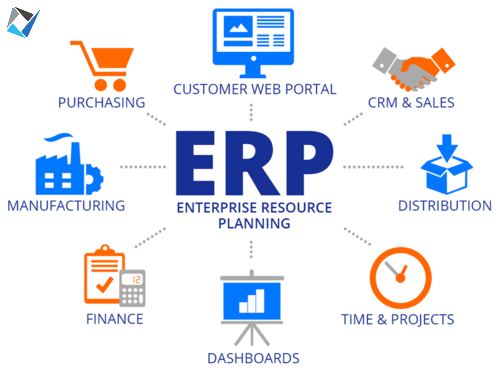
Apart from that, ERP is composed of tools that can help you accomplish tighter control over each department across the company, helping you deal with the following:
- Ecommerce strategy
- Contacts
- Warehouse operations
- Logistical requirements
- Inventory levels
- Supply chain
- Sales numbers
- Customer relationship management / Customer Service
Are you currently seeking an alternative to QuickBooks? You may then like to go for an ERP vendor that concentrates on functionality and business performance, which is helpful not just to your financial department but also to all departments.
Some of the benefits of using an ERP are as follows:
- Cross-department collaboration
- Standardized financial processes
- Practical business intelligence features
- No identical entries
- Improved automation
- More powerful and dependable reporting
- Enhanced data security
- Real-time data
Also check, EPC Group ERP Integration Services
How to know if you require an ERP Accounting solution?
Does it take longer for your organization to reconcile financial transactions at every month’s end? Do you depend on guesswork than hardcore figures and facts to forecast sales? Do you notice a faltering in the customer satisfaction ratio?
Here are signs you need an ERP solution for your accounting needs:
- You lack centralized processes
- Your accounting is complicated and time-consuming
- You always have tedious financial reporting
- You have poor accounting and sales
Introduction to Microsoft ERP for Accounting System and its benefits
Microsoft Dynamic 365’s ERP functionalities make it an excellent option across many verticals, including business accounting and other core business processes.
Dynamic 365 suite of software has long been a practical tool for business accounting. It is the perfect platform for businesses that would outgrow entry-level accounting systems and benefit from capacities such as integrated payroll functionality. Also, having capabilities of making data-driven decisions or informed decisions.
Dynamics NAV featured a broad spectrum of features for international companies and manufacturers. Meanwhile, Dynamics AX presented an inclusive back-end solution for all operational and financial needs.
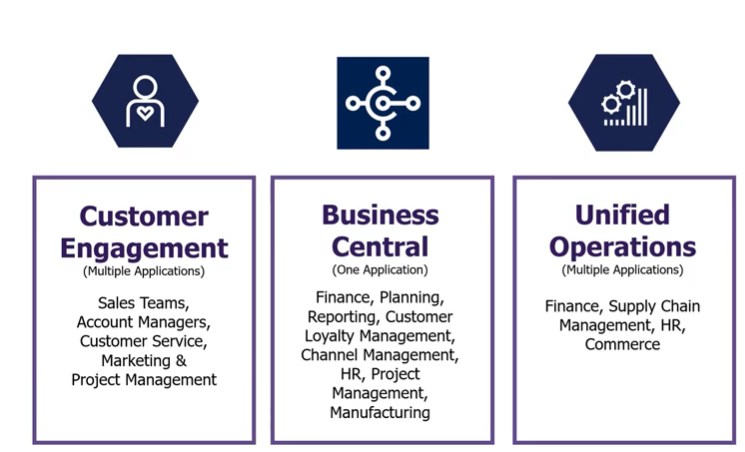
Some of the benefits of Dynamics 365 for accounting include:
- Offers business intelligence tools
- Ease of use
- Future proof for company’s investment
- Connectivity
- Offers better data insight
First Accounting ERP Option: Microsoft Dynamics 365 Finance & Operation
Dynamics 365 for Finance and Operation is designed on the foundations of what was called Dynamics AX. It is the most extensive and advanced Microsoft ERP system that features modules like supply chain management, manufacturing, and financials.
It comes bundled along with two added apps for human resource management and retail. The app is equipped for big businesses of 250+ staff and carries a twenty-use minimum.
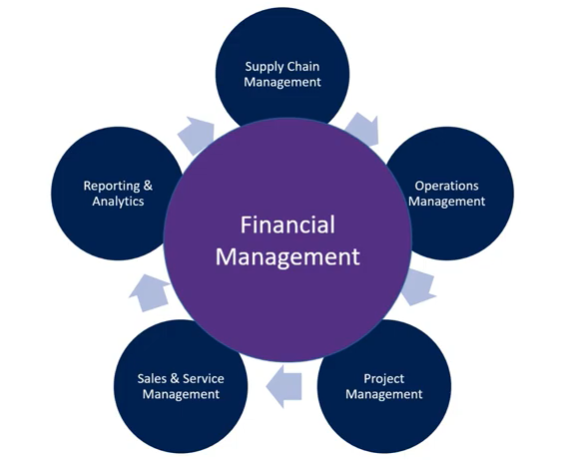
Finance and Operations feature all the financial management capacities you would expect, plus the perks which come with a smart, cloud-hosted solution. Bank reconciliation, account schedules, budgeting, account receivables and payables, and general ledger capabilities are included in this ERP option.
If you plan to go with this option, you must license it as part of the plan. Take note it’s not accessible on a standalone basis. It comes as part of either the Dynamics 365 plan or Unified Operations plan. The latter comprises core ERP apps and costs $190 per use/month fur a full access seat.
Second Accounting ERP Option: Microsoft Dynamics 365 business central
Meanwhile, Microsoft Dynamics 365 Business Central is the flagship ERP for small to medium-sized enterprises of at least 50-250 workers. This is built to be more of a go-to-place and one-stop-shop for smaller organizations that do not need comprehensive capacities.
It offers businesses a bit of everything to transform your organization into intelligent organization and improve business operations, such as project management, CRM, supply chain, operations, and finance. The good thing about it is there’s no user limit. Hence, companies of all sizes can enjoy its features.
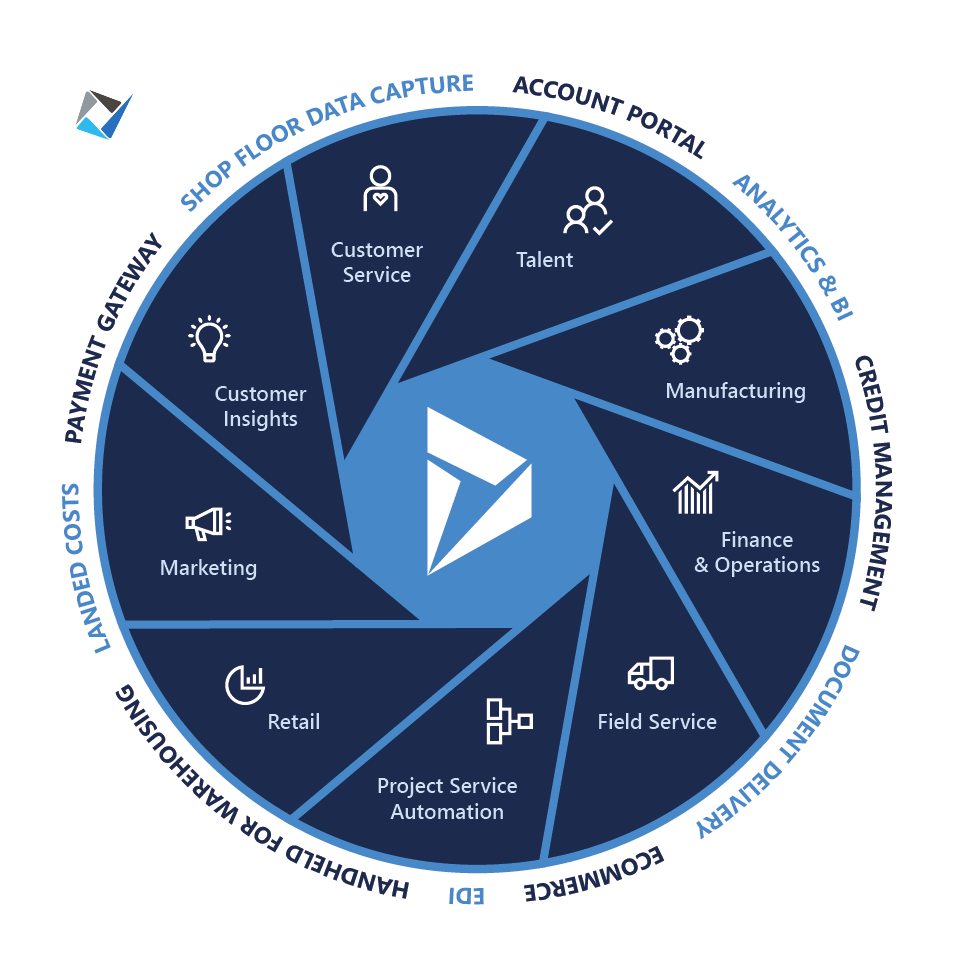
Further, Business Central features like complex data recording have a broad spectrum of financial management competencies at the center of its functionality. The app features what you would normally expect from an intelligent, modern cloud based ERP, such as performing year and period closes, preparing VAT reports, cost management, overseeing cash flows, organizing payables and receivables.
In this ERP option, your journey to accounting superstardom is a bit simpler. You can connect to other Dynamics 365 apps and are not licensed as a standalone option. Full user licenses are $70/user per month for the Essentials Edition. For the Premium, it’s $100/user per month. It will give you access to the app’s manufacturing modules and service management along with regulatory compliance.
Roles and Benefits of ERP For Supply Chain Management
Remember that an ERP system is vital for accessing real-time operational data across numerous businesses and departments. Lacking precise insight into the different working processes and activities that handle your supply chain could leave you unable to make processes that provide a sustainable competitive benefit.
ERP in supply chains play an important role in different aspects of the formation and maintenance of a superb procurement process that may involve:
- Demand and planning
- Procurement
- Production
- Shipment
ERP system can also make real-time supply chains, and your company could reap the benefits. You may be thinking, what specific benefits will you realize?
- Total control
- Automation and accessibility
- Risk management
- Faster decision making
- Efficient forecasting and lean inventory
EPCGroup approach and experience for implementing ERP solution
Are you considering a new enterprise resource planning system or maybe an accounting system? Below are some advice and tips from EPCGroup that can help you when implementing ERP or business management software.
- Determine your goal of having an ERP accounting software to guarantee your business maximizes the investment
- Allocate an ERP professional to support consistency and quality control
- Do not ever compromise with data quality
- Always keep it simple and short so that entering, retrieving, and exporting information is simplified and simple to do
- Consider implementing customizations like integration with other solutions to meet the unique requirements of your business
- Grow with your ERP accounting software
- Get your staff involved with your ERP accounting software to enhance the adoption rate by giving training opportunities
- Assess the amount of cost, manpower, effort, and time needed to keep your solution
- Keep the solution free of junk data by doing regular audits
Conclusion
Remember that implementing ERP functionality to your accounting is not only a great business idea, but it could indicate the difference between erroneous, short-sighted record keeping and financial growth as well as stability.
ERP offers the big picture visibility that most decision-makers require to learn their business from all angles.
Is your ERP project team ready to find out more about ERP solutions? Our team would love to help! We are composed of ERP consultants with the expertise and skills to help you assess the accounting functionality of different ERP systems.
You see, ERP has become a crucial part of the businesses for nearly all sectors and all the good reasons. Companies are insanely employing it for the many benefits it has to offer. So, what are you waiting for? Go ahead and use ERP accounting software to bring your business to the next level!


